Key Takeaways: pCloud vs Dropbox
- The main difference between pCloud and Dropbox is privacy. pCloud does collect your data, but not to the extent that Dropbox does. Additionally, pCloud offers client-side encryption called pCloud Crypto as a paid add-on.
- Dropbox supports a collaborative and productive environment with external connections to Microsoft 365 and Google Workspace and in-house apps like Dropbox Paper that allow you to work in real time with others.
- Neither pCloud nor Dropbox will break the bank as both offer affordable paid plans for individuals.
-
08/21/2023 Facts checked
This article was rewritten to capture feature updates and include current pricing.
pCloud and Dropbox are popular cloud storage services. One offers excellent security and a private encryption folder. The other provides many tools that support productivity and collaboration. Both are among the best in the cloud storage industry. Choosing between the two can be difficult, so we will help you by comparing pCloud vs Dropbox.
pCloud brings more to cloud storage than an encryption folder. It supports different customers with affordable plans and has a dedicated media player. Dropbox has connections to popular third-party integrations, while also providing a suite of homegrown apps. We look at these features and more below.
-
1
- :
- :
- :
- :
-
2
- :
- :
- :
- :
How Did We Rate pCloud vs Dropbox
In our pCloud review and Dropbox review, you’ll see that we put each service through several tests and real-world scenarios. We identified what worked well and addressed areas where we felt either service lacked in its offerings. Using this information, we are well situated to compare pCloud and Dropbox head-to-head to help you decide between the two.
Dropbox vs pCloud: Similarities & Differences
pCloud and Dropbox share several features, including file sharing, syncing, and excellent upload and download speeds. However, where these two cloud storage providers differ is significant. Privacy is one key area, as are external integrations and support for businesses. Let’s explore these areas in more detail.
| 500GB – Unlimited GB$4.17 / month(All Plans) | 2TB – 5TB$9.99 / month(All Plans) | |
| Review | Review | |
| Sync Folder | ||
| Block-Level Sync | ||
| Selective Sync | ||
| Bandwidth management | ||
| Sync Any Folder | ||
| File Link Sharing | ||
| Link Passwords | ||
| Link Expiry Dates | ||
| Folder Sharing | ||
| Folder Permissions | ||
| Link Download Limits | ||
| Upload Links | ||
| File Previews | ||
| Edit Files | ||
| In-App Collaboration | ||
| Office Online | ||
| Google Docs | ||
| Notes App | ||
| Media Playback | ||
| Mobile Apps | ||
| Deleted File Retention | ||
| Versioning | ||
| WebDAV | ||
| At-Rest Encryption | ||
| In-Transit Encryption | ||
| Encryption Protocol | AES 256-bit | AES 256-bit |
| Zero Knowledge | ||
| Two-Factor Authentication | ||
| Server Location | US | US |
| 24/7 Support | ||
| Live Chat Support | ||
| Telephone Support | ||
| Email Support | ||
| User Forum | ||
| Knowledgebase | ||
| Free Plan |
Similarities
pCloud and Dropbox have free plans that let you try each service, as well as strong file sharing and syncing. We explore these similarities and more in this section.
Free Plans
pCloud advertises that you get 10GB of free cloud storage, which is more than enough to try the service. However, you’ll only get 2GB upon account creation, and you only get 7GB after completing the basic setup tasks. To get the remaining 3GB, you’ll need to invite friends. A free pCloud account gives you access to most features, except some advanced sharing options.
Dropbox also has 2GB of free storage space and offers a few ways to expand that storage amount. Similar to pCloud, if you complete a few tasks like uploading files or downloading the mobile app, Dropbox will add 250MB of storage space to your account. It’s not much and a far lower amount than pCloud.
Pricing Plans
pCloud has several plans for individuals, families or businesses. The Premium plan has 500GB for $49.99 when paying annually. The Premium Plus plan increases the storage space to 2TB for $99.99 annually.
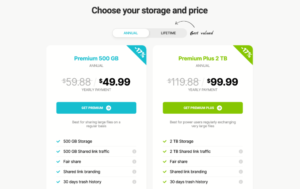
the other with 2TB. These plans have monthly and annual pay options.
pCloud has family plans for up to five users for a one-time payment as part of its lifetime plan offerings. We go into more detail in our pCloud lifetime plan article. pCloud also has two business plan choices: Business and Business Pro. Each requires a minimum of three users, and both plans include pCloud Crypto, which we will cover in the differences section below.

Dropbox has several plans to choose from for individuals and teams. The Plus plan has 2TB of storage space and is $9.99 monthly when billed annually. The Standard plan is designed for smaller teams and costs $15 per user per month for three or more users. The Advanced and Enterprise plans have unlimited storage space. The Advanced plan costs $24 per user per month, while the Enterprise plan is customizable and requires contacting sales.
File Sharing
When sharing folders with pCloud, you can create a shareable link or send an invite directly to the folder. With a folder link, you’ll have several options, including allowing downloads or uploads, setting an expiration date, or adding password protection. However, these are only available if you upgrade your plan.
Sending an invite to a folder via email only lets you choose from view or edit options, since the recipient must also have a pCloud account.
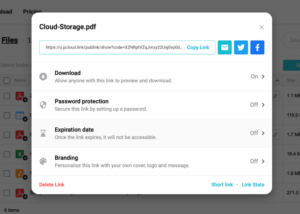
including options like adding a password or expiration date.
pCloud only lets you share files by creating a link. However, you get mostly the same options as with sharing a folder, including adding layers of protection.

Dropbox lets you share folders and files with the same options: directly via email or by creating a link. Folders you share using email have additional features that allow you to manage what type of access recipients get. Additionally, you can create a link for editing or viewing. Each option has settings, although most are locked behind the Professional plan or higher. This includes adding passwords to links that allow editing.
File Versioning
pCloud has file versioning for all its plans, including the free one. A free plan gets you 15 days of file versions, with no limit on the number of versions for a given file. Paid plans and lifetime subscriptions with pCloud get 30 days, and pCloud business plans get 180 days.
Dropbox makes its version history allotments based on plans. Its Basic, Plus and Family plans offer 30 days of file versioning. The Professional, Dropbox One and Standard plans get 180 days, and the Advanced and Enterprise plans get a year.
If the above options aren’t enough, pCloud and Dropbox offer extended version history. pCloud’s extended file history paid add-on increases file versions for all plans up to 365 days. Dropbox offers extended file history as a paid add-on for some, but not all, of its plans. The Plus plan increases version history to one year, while the Advanced, Standard and Enterprise plans get 10 years of file versioning.
Speed
pCloud and Dropbox are two of the fastest cloud storage services. Both services will handle large or multiple files without slowing your productivity. When we tested pCloud and Dropbox, we used the same combination of files (docs, images and videos) totaling 5GB. We uploaded and downloaded them twice from our virtual servers located in Dublin, Ireland. These servers have a max speed of 1 Gbps, which we cap to 100 Mbps.
Dropbox was slightly faster at uploads, with an average of 8:00. pCloud averaged 8:12 for its upload tests. For downloads, pCloud had a blazing average of 6:42. Dropbox kept pace, albeit with a slower 7:42. Neither service was a resource drain. We didn’t experience many — if any — slowdowns during the data transfers.
Differences
Privacy is the most notable difference between pCloud and Dropbox. However, there are others, like external integrations and backup features. Let’s dive in and see.
Third-Party Integrations
Dropbox has several connections to third-party apps, making it one of the best cloud storage for collaboration. It supports integrations with Microsoft 365 and Google Workspace. Connecting either to your Dropbox account lets you create and edit files from their ecosystem without leaving Dropbox. Files you share using apps such as Word or Sheets let recipients collaborate on the document with you.
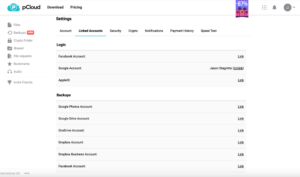
Dropbox has an app center that contains all the external connections it supports. You can connect to Adobe to manage PDFs, Canva for graphics or Zapier to support workflow automation.

third-party app connections to keep you productive.
pCloud does not support third-party connections or integrations in the same way as Dropbox. For example, you can link your login to Google from your account settings and transfer files from Google Photos or Drive into your pCloud account. Other external connections include Facebook, Apple ID, OneDrive and Dropbox.
Native Apps
Dropbox offers several homegrown apps with every account, including the free one. A prime example is Dropbox Paper, a web-based word-processing program that supports real-time collaboration. Another is called Dropbox Capture, a downloadable program that records what you are doing on your computer. You can use it for training or demonstrating the steps of a process.
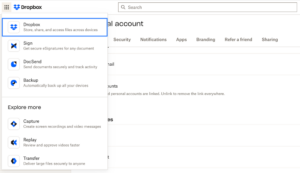
like Dropbox Paper, Capture and Replay.
Not all of Dropbox’s apps are free. One paid app is Dropbox DocSend, which provides analytics on how many people download or interact with your files. You can create spaces to share files or securely share files with contacts.
Within a pCloud account, you won’t see an app center or any additional apps that work with your data. However, pCloud does offer a transfer service. pCloud Transfer is not tied to an account, as it’s free for anyone to use. You can securely send a file or multiple files up to 5GB in size to one or more email addresses.
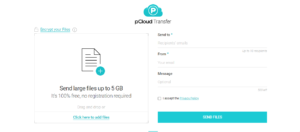
up to 5GB in size without an account.
pCloud Pass is another app you can use. It is an encrypted password manager that saves and auto-fills your login credentials on websites or apps. You can use pCloud Pass for free on one device.
If you have a pCloud account, there’s a tab dedicated to audio files. Any music you upload to your account gets categorized and sorted within the audio tab, letting you filter by artists, songs, albums or playlists. You can play music from the web browser as pCloud’s dedicated music player enables you to load or save a playlist, shuffle songs or play on repeat.
Privacy
pCloud does an excellent job of only using the data it needs to process activity on your account. It is upfront about the data it uses with an easy-to-read privacy policy. However, pCloud does collect data on how you use its product and will share it with third-party entities when complying with laws.
If you subscribe to pCloud Crypto, anything you store in the Crypto folder has zero-knowledge encryption. This means only you can access the data stored in the folder, and it is truly private. Additionally, as pCloud is a Switzerland-based company, it adheres to some of the best privacy laws in the world.
Dropbox is open about collecting and using your data, as privacy is not one of its strongest areas. If necessary, Dropbox can also access the data in your account, per its privacy policy. Some of the data Dropbox shares is necessary to provide the connections it does, such as with Google.
For business accounts, private encryption could be coming. Dropbox recently purchased Boxcryptor. When implemented, it could provide some or all of a business account with zero-knowledge encryption.
Business Support
The pCloud Business plan adds tabs and features to accounts that help manage and support teams. It does not add any external connections. However, you can securely share with colleagues. Additionally, administrators can organize and determine access to team folders. A comments feature on folders supports quick team communications. If your company has branding or a logo, you can include that with folders you want to share externally.
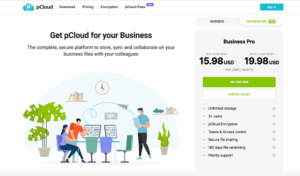
Dropbox Business is one of the best cloud storage for businesses. It has a dedicated set of business plans that offer a range of support for individuals, small teams or larger enterprises. An admin center provides a dashboard that lets administrators see and manage team members or invite external collaborators. Admins can track team activity or adjust roles and permissions. Support apps include eSign capabilities or tracking with DocSend.

Which Is Better: Dropbox vs pCloud?
pCloud does a good job of providing its users with excellent privacy. If you elect to pay for pCloud Crypto, anything stored in that folder has zero-knowledge encryption and will remain private and accessible only to you.
Dropbox focuses on cloud features and collaborative apps that support individuals and businesses. There’s no shortage of external connections to popular apps, making Dropbox a great option to create and edit files in one place.
We give the edge to pCloud as it has great cloud features, such as file sharing, flexible versioning and excellent privacy. The addition of pCloud Crypto — despite being a paid feature — allows users to store sensitive or confidential information safely and securely.
We Recommend pCloud If You Want…
- Private encryption: If you include the paid add-on, pCloud Crypto provides a client-side encryption folder for your important files.
- Multimedia player: pCloud lets you play, create and organize your music in one place with a fully featured web-based multimedia player.
- Affordable business plans: Businesses will find affordable plans to keep teams connected and productive.
We Recommend Dropbox If You Want…
- Third-party integrations: Dropbox lets you connect to your Microsoft 365 or Google Workspace account and work with the respective files in the web app.
- Collaboration and productivity: Dropbox makes it easy to share and work on documents internally or externally, often in real-time.
- Native apps: Dropbox Paper and Dropbox Capture are two apps that come with every Dropbox account.
If You Want to Consider Other Services, Check Out…
Sync.com heads up other cloud storage providers and tops the list as the best encrypted cloud storage. It has zero-knowledge encryption for the whole account, including its 5GB free plan. Additionally, Sync.com has a generous versioning policy, ranking well as one of the best cloud storage for versioning. We cover these features and more in our Sync.com review.
MEGA is another cloud storage solution with zero-knowledge encryption that protects the entire account. It has one of the most generous free plans available at 20GB. MEGA also has a secure chat feature with every account that lets you have encrypted text chats with other MEGA users. Check out our MEGA review for more information.
Zoho WorkDrive has various apps created within the Zoho ecosystem that support individuals and businesses among many industries. It’s an affordable option for businesses of different sizes. To learn more, check out our Zoho WorkDrive review.
Box has many of the same third-party connections as Dropbox, including Microsoft 365 and Google Workspace. It also has its own apps, such as Box Notes, a web-based word processor that supports collaboration and real-time editing. We cover these features and more in our Box review.
-
1
- :
- :
- :
- :
-
2
- :
- :
- :
- :
-
3
- :
- :
- :
- :
-
4
- :
- :
- :
- :
-
5
- :
- :
- :
- :
The Verdict: Why We Think pCloud Wins Overall
It’s not a clear-cut runaway, but pCloud edges out Dropbox as the better overall choice. pCloud’s combination of excellent file sharing, affordable plans and the option to include a private encryption folder is hard to beat. However, if productivity and collaboration are of the utmost importance, Dropbox will more than meet your needs.
Have you used pCloud or Dropbox? What are some of the features of either service you like the most? Do you recommend another cloud storage platform readers should consider? Let us know in the comments section below. Thanks for stopping by to read our article.
FAQ: Dropbox vs pCloud Compared
-
pCloud is a trustworthy cloud storage provider. It has excellent security, using AES 256-bit encryption to protect data at rest and TLS/SSL encryption protocols for data transfers. Additionally, with pCloud Crypto, you gain access to a zero-knowledge encrypted folder that’s only accessible to you.
-
Yes. pCloud has lifetime plans for individuals with storage amounts of 500GB, 2TB or 10TB. Additionally, it offers 2TB and 10TB family plans that are only available as lifetime subscriptions.
-
Sync.com is the most secure cloud storage provider, offering private encryption for an entire account. Its servers are located in Canada, and it adheres to the General Data Protection Regulation (GDPR). Additionally, it protects your data storage and transfers with AES 256-bit encryption and TLS/SSL encryption protocols.
{“@context”:”https:\/\/schema.org”,”@type”:”FAQPage”,”mainEntity”:[{“@type”:”Question”,”name”:”How Trustworthy Is pCloud?”,”acceptedAnswer”:{“@type”:”Answer”,”text”:”
pCloud is a trustworthy cloud storage provider. It has excellent security, using AES 256-bit encryption to protect data at rest and TLS\/SSL encryption protocols for data transfers. Additionally, with pCloud Crypto, you gain access to a zero-knowledge encrypted folder that\u2019s only accessible to you.\n”}},{“@type”:”Question”,”name”:”Does pCloud Offer a Lifetime Plan?”,”acceptedAnswer”:{“@type”:”Answer”,”text”:”
Yes. pCloud has lifetime plans for individuals with storage amounts of 500GB, 2TB or 10TB. Additionally, it offers 2TB and 10TB family plans that are only available as lifetime subscriptions.\n”}},{“@type”:”Question”,”name”:”What Is the Most Secure Cloud Storage Provider?”,”acceptedAnswer”:{“@type”:”Answer”,”text”:”
Sync.com is the most secure cloud storage provider, offering private encryption for an entire account. Its servers are located in Canada, and it adheres to the General Data Protection Regulation (GDPR). Additionally, it protects your data storage and transfers with AES 256-bit encryption and TLS\/SSL encryption protocols.\n”}}]}
The post pCloud vs Dropbox: An In-Depth Comparison for 2023 appeared first on Cloudwards.

